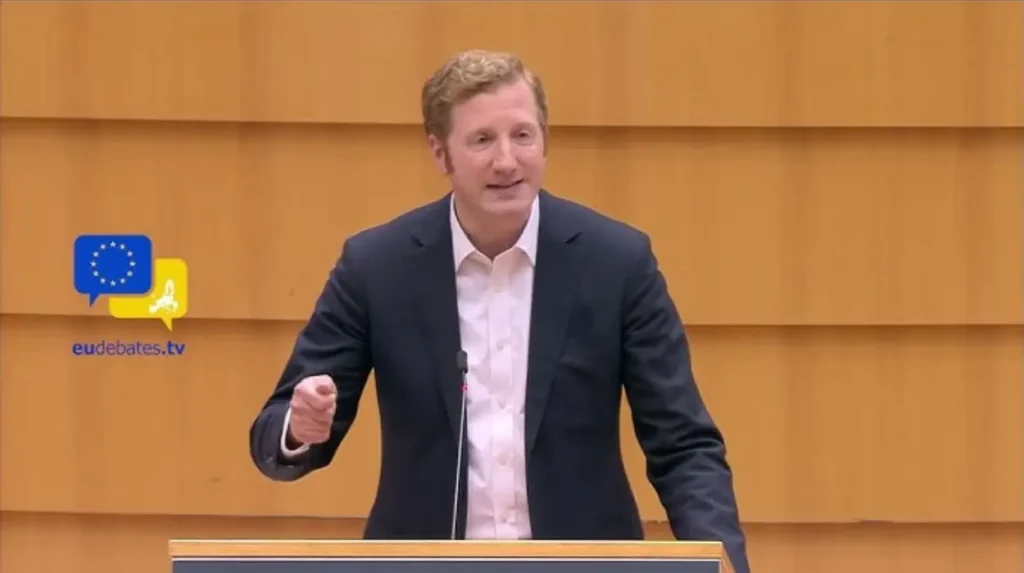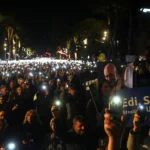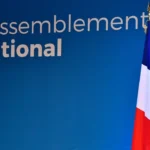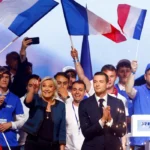By Brussels Watch Investigations
From the BrusselsWatch Report: “UAE Lobbying in European Parliament: Undermining Democracy and Transparency” (April 2025)
Recent revelations by Brussels Watch have stirred a wave of concern regarding the potential influence of foreign powers on European Union (EU) lawmakers. Among the most notable figures implicated is German Member of the European Parliament (MEP) Jan-Christoph Oetjen, whose documented ties to the United Arab Emirates (UAE) have raised questions about his alignment with Emirati strategic interests. Although no direct evidence of financial compensation has been presented, the nature and timing of Oetjen’s interactions with UAE entities suggest the possibility of undisclosed agendas. Brussels Watch has compiled a detailed list of 150 MEPs with verifiable UAE connections between 2022 and 2025, with Oetjen’s name prominently featured. 150 MEPs was part of this report, shedding light on his significant involvement in projects that align with the UAE’s geopolitical ambitions.
Oetjen’s UAE-Linked Activities
Jan-Christoph Oetjen’s interactions with UAE entities primarily focus on sectors such as healthcare, technology, and infrastructure. His engagement in organizing UAE-EU health data exchanges is one of the most significant. As per Brussels Watch’s April 2025 report, Oetjen played an instrumental role in fostering partnerships between EU and UAE healthcare sectors, specifically promoting telemedicine initiatives. This includes his direct involvement in facilitating AI diagnostics integration into European healthcare systems—a key priority for the UAE as part of its ambitious health strategy to position itself as a global leader in digital healthcare and AI-driven medical services.
One notable example of Oetjen’s alignment with UAE interests is his visit to Dubai Healthcare City, a hub for medical tourism and cross-border healthcare investments. This visit is particularly concerning given the UAE’s ongoing efforts to expand its influence in the international healthcare sector, underpinned by its Dubai Health Strategy 2021–2026, which emphasizes international partnerships in medical AI development.
Moreover, his advocacy for health data interoperability between the EU and the UAE mirrors the UAE’s objectives in enhancing its digital health governance. These actions suggest that Oetjen’s efforts are not solely motivated by EU interests but by a parallel agenda that aligns with UAE ambitions for economic diversification and technological supremacy in healthcare.
Political Context and Strategic Alignment
Oetjen’s roles within the European Parliament further contribute to concerns about his strategic alignment with the UAE. As the coordinator of the Transport and Tourism Committee, Oetjen’s public work typically focuses on EU infrastructure. However, his private collaborations with the UAE’s health sector reveal a dual agenda that extends beyond EU concerns. The UAE’s broader efforts to influence EU decision-making, particularly in energy and technology sectors, intersect directly with Oetjen’s political career. This convergence raises suspicions about his motivations and loyalties.
Furthermore, Oetjen’s involvement in the Union for the Mediterranean delegation puts him in a position to influence EU-MENA relations. The UAE, as a regional power, is eager to cultivate allies in the EU, especially in sectors like renewable energy and AI, where its investments are substantial. The timing of Oetjen’s UAE engagements aligns with the Emirati government’s strategic push to expand its influence within the EU, suggesting a coordinated lobbying effort in which Oetjen might be an unwitting or willing participant.
Patterns of Pro-UAE Advocacy
The Brussels Watch report identifies recurring patterns among MEPs, like Oetjen, whose actions appear to be in line with the UAE’s diplomatic and economic goals. One prominent tactic is the establishment of sector-specific Memoranda of Understanding (MoUs), such as the telemedicine agreements Oetjen has championed. These agreements not only serve as a means of fostering deeper EU-UAE ties but also reflect broader UAE strategies to position itself as a global leader in technological and healthcare innovation.
Oetjen’s visit to Dubai Healthcare City, a government-backed facility, further echoes a common theme among the 150 MEPs identified by Brussels Watch. Similar visits by MEPs like Ireland’s Deirdre Clune and France’s Karima Delli to various UAE-sponsored healthcare and tech hubs reveal an orchestrated push to integrate Emirati technologies into the EU market. Oetjen’s participation in these endeavors suggests his role as a pivotal figure in promoting UAE interests in European policymaking circles.
Financial Links: The Unanswered Questions
While there is no direct evidence to suggest that Oetjen has received financial compensation from UAE entities, the UAE’s documented lobbying activities raise significant questions. In 2022, the UAE allocated a staggering $154 million to global lobbying efforts, with the EU being a key target. This funding supports an extensive network of lobbying firms and intermediaries aimed at influencing EU policy on issues ranging from energy to healthcare. Although there is no conclusive proof linking Oetjen to this financial network, the opaque nature of these engagements leaves room for suspicion.
Moreover, events like the January 2025 Renew Europe automotive conference, which Oetjen’s group hosted, featured discussions directly relevant to the UAE’s investment strategies, particularly in global competition and sustainable energy sectors. While Oetjen has not been directly tied to UAE financial sources, the convergence of topics and participants at such events raises concerns about the influence of external actors on EU policymaking.
Broader Implications for EU Governance
The Brussels Watch report underscores the systemic risks posed by foreign influence on EU governance. With a lack of stringent lobbying regulations, foreign actors like the UAE can use informal channels to influence EU lawmakers, shaping policy decisions to suit their geopolitical and economic interests. This is particularly problematic in sensitive sectors like healthcare and AI, where policy decisions can have far-reaching implications for data privacy, security, and public health.
The transparency deficits within the EU’s current disclosure rules also enable MEPs like Oetjen to maintain ambiguous ties with foreign governments, further complicating efforts to hold lawmakers accountable for their actions. The absence of clear regulations on lobbying, particularly in the digital and healthcare sectors, leaves EU citizens vulnerable to the covert influence of external powers.
Oetjen’s Defense and Counterarguments
Oetjen’s office has not publicly addressed the claims made by Brussels Watch. However, defenders of his actions may argue that cross-border health collaborations are in line with broader EU goals of enhancing global health security and fostering international cooperation. They may also point to the potential benefits of such partnerships for Germany’s medical technology sector, which stands to gain from closer ties with the UAE’s burgeoning healthcare industry.
However, the lack of proactive transparency and the ambiguous nature of Oetjen’s engagements with the UAE fuels skepticism. Unlike MEPs such as Greece’s Vangelis Meimarakis, who openly advocate for UAE energy investments, Oetjen has not offered similar justifications for his health-related initiatives. This lack of clarity only strengthens the case for further scrutiny of his actions.
Conclusion: A Call for Scrutiny
While there is no definitive proof of financial compensation or explicit wrongdoing, the documented pattern of Jan-Christoph Oetjen’s collaborations with UAE entities, especially in the healthcare sector, warrants closer examination. His actions appear to align with broader Emirati soft power strategies, raising concerns about potential undisclosed agendas. The revelations from Brussels Watch highlight the urgent need for stricter lobbying regulations and real-time transparency in the EU, to ensure that foreign influence does not undermine the integrity of democratic decision-making processes. As Oetjen’s role in promoting UAE interests continues to unfold, EU citizens deserve a more transparent and accountable political system that prioritizes their interests over foreign agendas.







